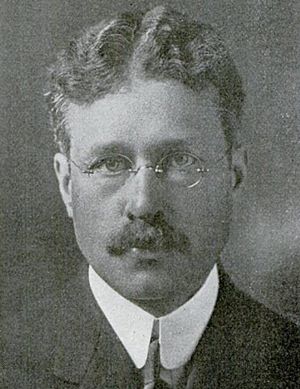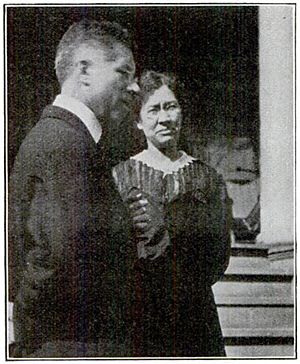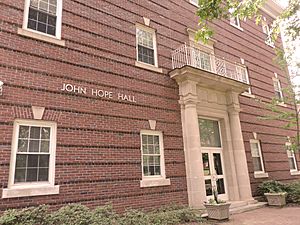John Hope (educator) facts for kids
Quick facts for kids
John Hope
|
|
|---|---|
 |
|
| Born | June 2, 1868 Augusta, Georgia, United States
|
| Died | February 22, 1936 (aged 67) Atlanta, Georgia, United States
|
| Occupation | Educator, political activist |
| Spouse(s) | Lugenia D. Burns |
| Parent(s) | James Hope, Mary Frances Taylor |
John Hope (June 2, 1868 – February 22, 1936) was an important American educator and activist. He was born in Augusta, Georgia. He made history as the first African-descended president of two important schools: Morehouse College in 1906 and Atlanta University in 1929. At Atlanta University, he worked hard to create strong graduate programs. Both of these schools are historically Black colleges, which means they were founded to educate Black students during a time when many schools were segregated.
John Hope was determined to get a good education. After his father passed away, he had to leave school to help his family. But he later went North to study, graduating from Worcester Academy and Brown University. He then returned to the South to teach. In 1906, he became the first African American president of Atlanta Baptist College, which later became Morehouse College. He led the college until his death in 1936. When Morehouse joined with Atlanta University in 1929, Hope was chosen as Atlanta University's first African-American president. He focused on building graduate programs there, making sure Black students could get higher education.
Hope was also very active in civil rights. He joined groups like the Niagara Movement and the National Association for the Advancement of Colored People (NAACP). He also worked with the Commission on Interracial Cooperation, which focused on improving relationships between different races in the South. Other groups he was involved with included the National Urban League, the YMCA, and the National Association of Teachers in Colored Schools. In 1936, he received the Spingarn Medal from the NAACP, a high honor for his achievements.
Early Life and Education
John Hope was born in 1868 in Augusta, Georgia. His father, James Hope, was a white merchant from Scotland. His mother, Mary Frances Taylor, was a free woman of color. This meant she was not enslaved, even before the Civil War. John's father had moved from Scotland to New York City, then later to Augusta, Georgia, where he became a successful businessman.
In Georgia, state laws made it illegal for people of different races to marry. However, John's parents lived together openly as a couple and had a family. John Hope looked mostly European. He could have chosen to live as a white person. But he chose to identify with the African American community. He dedicated his life to improving education and opportunities for Black people in the segregated South after the Civil War.
When John was eight, his father died. His family faced financial difficulties. John had to leave school after eighth grade to work and help his family. But five years later, John was determined to continue his education. He managed to go North for school. He graduated from Worcester Academy in 1890. Then he went on to Brown University, graduating in 1894. While at Brown, Hope was a member of the Alpha Phi Alpha fraternity.
Career and Marriage
After finishing his studies, John Hope returned to the South. He began teaching at Roger Williams University in Nashville, Tennessee. This was a historically Black college that started after the Civil War.
On December 29, 1897, John Hope married Lugenia D. Burns from Nashville. They had children together. Lugenia Burns Hope later became a famous social reformer in her own right.
In 1898, Hope became a professor of Classics at Atlanta Baptist College. This school is now known as Morehouse College. He moved his family to Georgia. In 1906, John Hope was chosen to be the president of Atlanta Baptist College. He was the first man of African descent to hold this important position. In 1913, the school's name was changed to Morehouse College.
John Hope became a leader in the fight for civil rights. He joined W. E. B. Du Bois and William Monroe Trotter to start the Niagara Movement. This group worked for equal rights for Black people. He was also active in the National Association for the Advancement of Colored People (NAACP), which was founded in 1909. Hope became known as a national leader for civil rights. He strongly believed that Black people should have the chance to get a full college education. This was different from Booker T. Washington of the Tuskegee Institute, who focused more on vocational training. Hope and Du Bois both agreed that Black people needed academic education to develop strong leaders for their communities.
Hope was also involved with the National Urban League, the "Colored Men's Department" of the YMCA, and the National Association of Teachers in Colored Schools. During World War I, Hope went to France. He worked with American Black soldiers as a YMCA secretary from 1918 to 1919. After returning to the U.S., he helped create the Commission on Interracial Cooperation in the South. He served as its first president.
John Hope continued as president of Morehouse College until his death in 1936. In 1928, Morehouse and Spelman College, a college for women, became connected with Atlanta University. In 1929, Hope was chosen as Atlanta University's first African-American president. He focused on building strong graduate programs at the university. He wanted to make sure that talented Black scholars had a place in higher education. He inspired many students and activists. During his time as president, Atlanta University started a graduate school, created a Department of Fine Arts, and opened the Trevor Arnett Library.
Legacy and Honors
John Hope received many honors for his important work:
- In 1932, he received an honorary degree (LL.D.) from Bates College.
- In 1936, he was given the Spingarn Medal by the NAACP.
- In 1950, a radio show called Destination Freedom in Chicago produced an episode about his life.
- John Hope College Preparatory High School in Chicago was named after him.
- Hope-Hill Elementary School in Atlanta was also named in his honor.
- Hope was invited to speak at the Alpha Phi Alpha fraternity's Silver Anniversary convention in Nashville, Tennessee.
- The Science Hall at Morehouse College was renamed John Hope Hall.
- In 2007, Worcester Academy created the John Hope Fellowship for young educators of color.
- Camp John Hope in Marshallville, Georgia, is also named for John Hope.
 | Emma Amos |
 | Edward Mitchell Bannister |
 | Larry D. Alexander |
 | Ernie Barnes |



